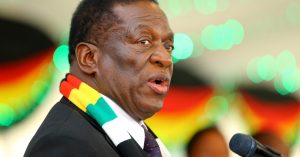

ZIMBABWE’S is losing millions of dollars to illicit financial flows in the tourism industry, which the government has earmarked as one of the critical sectors to drive economic growth, according to an investigation by The Financial Gazette.

Reserve Bank governor John Mangudya and Finance Minister Mthuli Ncube
The southern African country is facing its worst economic crisis in a decade despite high hopes that an increase in tourists and foreign currency earnings may breathe energy into the ailing economy.
Although foreign tourists arrivals reached an all-time high of 2,6 million in 2018 earning Zimbabwe over US$1 billion, according to official statistics, this has not slowed down rising poverty in the country.
More than half of Zimbabwe’s 16 million population is currently food insecure, with nine out of 10 children, aged six months to two-years-old not consuming a sufficient diet, according to Hilal Elver, the United Nation’s Special Rapporteur on the Right to Food.
While Zimbabwe’s tourism figures are looking positive, experts believe there are leakages in the sector largely due to an antiquated financial accounting system that are depriving the nation capital needed to bridge its huge infrastructure deficit and improve livelihoods.
Comparisons with Kenya and Tanzania highlight the problem.
For instance, Kenya earned over US$1,5 billion last year following the arrival of 2,020 million tourists, while Tanzania’s tourism receipts reached US$2,4 billion from 1,49 million tourists who visited the east African country.
“Most companies in the hospitality and safari sectors usually instruct foreign tourists to make payments into their offshore accounts on the pretext of wanting to use the money on capital expenditure, but some of the money rarely makes its way into Zimbabwe. The country only gets a portion of the money when tourists spend some of their finances here,” said a source familiar with operations in the sector.
Economic analyst Francis Mukora said the sophisticated and rampant trade misinvoicing, which is a major aspect of illicit financial flows, in the tourism industry was a bottleneck on Zimbabwe’s growth and opportunities.
“The practice is not only denying the government billions of dollars in foreign exchange and taxes revenue each year, but it also weakens political and economic institutions that are key to state building because misinvoicing makes it harder for concerned state institutions to collect taxes and levies,” he told The Financial Gazette.
Mukora said research has shown that international tourists spend an average of US$1 250 for the stay in Zimbabwe compared to US$310 spent in regional countries. “Judging by these figures alone, Zimbabwe could have earned more than US$3,2 billion in foreign currency, which is way above the US$1 billion declared by tourism players,” he added.
Operators in the tourism industry are treated by the government as exporters — who under the law have 90 days in which to transfer to Zimbabwe earnings from abroad — but it is hard for the authorities to establish when the receipts are understated.

Zimbabwean attractions, particularly the Victoria Falls, have seen increased positive coverage in the international media.
A report by the Zimbabwe Economic Policy and Research Unit (Zeparu) says although the government has identified the potential high value of tourism, it was facing serious problems that were undermining its contribution to economic growth, export earnings, employment creation and poverty reduction.
“Some of the challenges currently affecting the growth of tourism in the country are; skills flight, poor state of the roads, poor tourism infrastructure, water and electricity shortages, few direct flights to and from source markets, and high utility charges which increase the cost of doing business in Zimbabwe thus making the destination less competitive,” the local think-tank said in a research note.
Furthermore, both air and ground transport network remain compromised.
The country’s road network is in a dilapidated state while major airlines are shunning the route to Zimbabwe. Over the years the country suffered the withdrawal of major airlines citing viability concerns. Zeparu noted that to address the above challenges as well as leakages in the sector, government should introduce a tourism satellite accounting system for effective tracking and efficient accounting of the contribution of tourism to growth.
The tourism satellite account is a popular method recommended by the United Nations World Tourism Organisation of measuring the direct contributions of tourism consumption to a national economy.
“Stakeholders in the industry are passionate about the need to accurately capture tourism inflows into the economy, thereby curbing leakages, through the operationalisation of a tourism satellite accounting framework,” the research unit added.
Illicit financial flows
Finance minister Mthuli Ncube, who is anticipating increased tourist arrivals this year, said government was concerned about low taxes being collected from the sector.
“We keep hearing about the issue of money being illegally kept out of the country, and government – through the central bank – is working on measures to ensure that all those engaged in illicit transfers are made to bring the money back into the country,” he said in an interview.
In his 2020 national budget, Ncube said Zimbabwe was putting in motion programs meant to steer the country towards the adoption of a tourism satellite account as a way of bringing transparency into the hospitality industry.
“The tourism satellite account is important as it will help the country to accurately account for the economic benefits of tourism to guide policy makers on the real economic value of tourism to the national economy,” he said.
“The country has completed the critical surveys required to complete the tourism satellite account and a roadmap has been produced in consultation with Zimstat, and funding is being availed,” he added.

President Emmerson Mnangagwa
Zimbabwe is seeking to earn US$7 billion from the tourism industry by 2030, but experts say the country may not achieve this target unless it plugs the holes of illicit financial flows and make its political and economic systems work in terms of deploying functional state institutions to enhance taxation.
Paul Matamisa, the Tourism Business Council of Zimbabwe (TBCZ) chief executive, said while he was not aware of companies in the tourism sector stashing funds offshore, he nonetheless condemned the practice.
“If there are any operators in the travel and tourism sector breaking the law then it is the belief of the TBCZ that the authorities will know this and will take action accordingly. This applies to all laws and rules, including those related to repatriation of foreign currency earnings,” he said.
New high-tech accounting system
Givemore Chidzidzi, the Zimbabwe Tourism Authority acting chief executive, said it was difficult at the moment to quantify exact earnings from the sector due to lack of high-tech accounting systems and called for the urgent establishment of a tourism satellite account.
“In some countries tourism earnings are calculated from direct, indirect and induced revenues, but here we only calculate using direct payments made by tourists to hotels, tour and safari operators. We are currently working with financial institutions to supply shops and other retailers with point of sale machines that accept international bank cards so that we capture tourists’ spending as well,” he said.
The tourism regulator, which has over 1 500 registered operators under its portfolio, also attributed the low revenue from the sector to the country’s marketing mix.
“Out of the 2,6 million tourists who visited Zimbabwe last year, 80 percent were from Africa who generally spend less than the 20 percent from international markets. This is in sharp contrast to Kenya and Tanzania, which both receive about 80 percent high net-worth visitors from source markets and only 20 percent from the region,” Chidzidzi said.
“This, however, does not mean there are no leakages in the sector, there could be one or two mischievous operators, but the law always catches up with those who break it.”
Tourism leakages are not only confined to Zimbabwe as a recent report by the United Nations Conference on Trade and Development (UNCTAD) also revealed that Africa’s tourism sector is losing significant revenues through economic seepages.

“Such leakages occur primarily as a result of foreign-owned tourism businesses repatriating profits to their home countries rather than reinvesting them in destination countries. Similarly, the reliance on imported inputs for use by tourism establishments in African countries contributes further to these leakages,” said Jane Muthumbi, UNCTAD’s economic affairs officer for Africa division.
She added that reducing leakages in Africa’s tourism is thus critical, as it can ensure the retention of a larger share of the sector’s revenues in African economies, which, in turn, can boost tourism’s contribution to the continent’s GDP, and support the achievement of the Sustainable Development Goals.
●This story was produced by The Financial Gazette. It was written as part of Wealth of Nations, a media skills development programme run by the Thomson Reuters Foundation. More information at www.wealth-of-nations.org. The content is the sole responsibility of the author and the publisher.